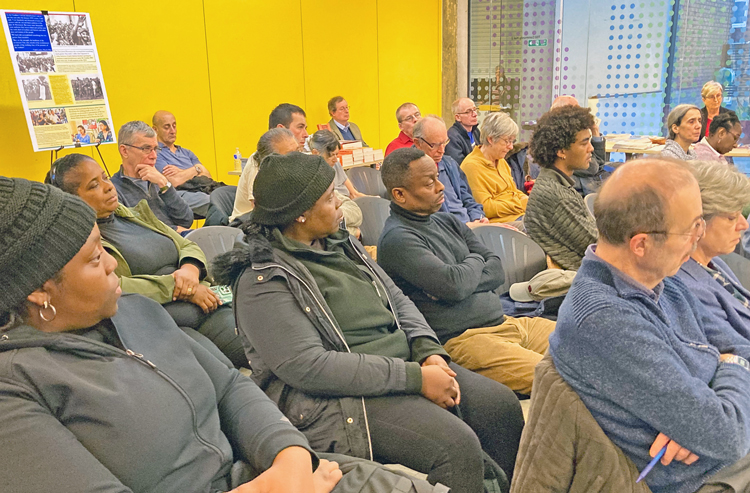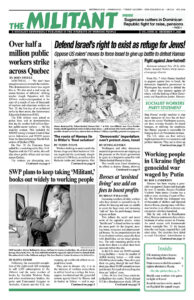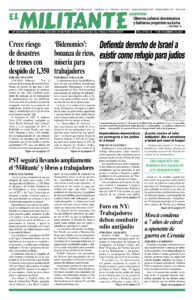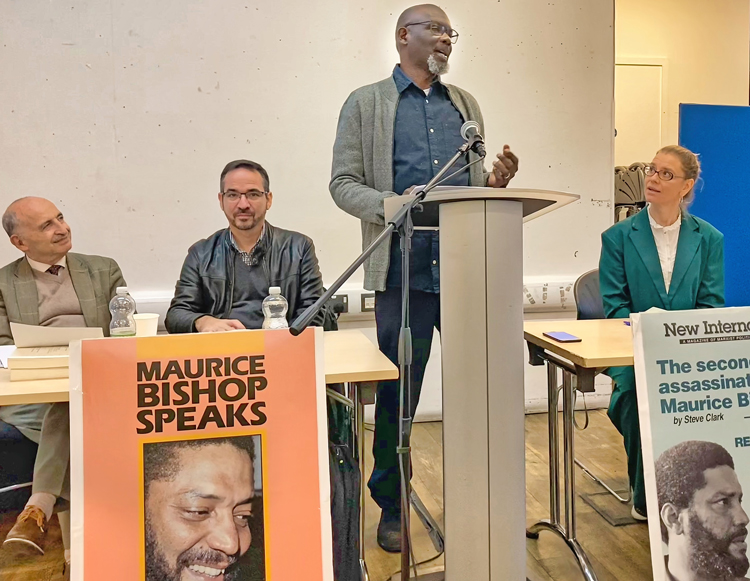LONDON — “The revolution was moving the country forward for the working class. That’s why I got involved,” Matthew Lord told 40 people at a “Maurice Bishop and the Grenadian Revolution” meeting here Nov. 18. Also on the platform at the event sponsored by Pathfinder Books were Michel Rodríguez, first secretary of the Cuban Embassy in London, and Jonathan Silberman, a leader of the Communist League. The three spoke earlier at a meeting in Manchester Oct. 28.
Lord, today an electrician in London, was a 14-year-old student in Grenada when the Bishop-led revolution triumphed in March 1979. He was a representative on his high school student council, took part in the revolution’s literacy campaign and joined the People’s Militia.
Lord described the revolution’s progress in organizing workers into unions, drawing in women and forging a network of workplace and neighborhood councils and assemblies. Agricultural production was increased, the economy grew, rural areas got electricity, education and health care were made free, unemployment was reduced, he said, all with the assistance of “our Cuban brothers and sisters.”
Rodríguez spoke of how Cuba recognized the revolutionary government and extended solidarity by “sharing the little we have.” Volunteer construction workers helped build a new airport and after the revolution was overthrown by the Stalinist forces of Bernard Coard, 25 died and 59 were wounded fighting a U.S. invasion arms in hand. Cuba continues its solidarity today, he said, including with volunteer medical teams.
‘Lessons of revolution are decisive’
“The lessons of the revolution are decisive,” Silberman said. “The more so in the turning point of world politics today, marked by Moscow’s war to destroy Ukraine and Tehran’s goal of destroying the state of Israel, of which the Oct. 7 massacre of Jews by Hamas was an horrific part.
“The greatest battle working people face is to throw off the self-image the rulers teach us and recognize that we can take power and organize society,” Silberman said. “Under Bishop’s leadership the Grenada Revolution showed that this is both necessary and possible.”
There’s a second “equally important lesson,” the Communist League leader said. “The need not only to storm the fortress but to hold it. In Grenada, that didn’t happen. The workers and farmers government was overthrown.”
Lord said the U.S. imperialist rulers did their best to destabilize the revolution, including a fall 1981 practice U.S. invasion carried out in Puerto Rico called “Operation Amber and the Amberines.” That “made me join the militia,” he said.
“But the revolution wasn’t defeated in a war with U.S. imperialism,” Silberman said. “It was overthrown by a Stalinist faction headed by Deputy Prime Minister Coard.” Coard’s group arrested Bishop and other leaders of the revolution. That defeat paved the way for a U.S. invasion. After Bishop was killed, “there was no appetite for a fight,” Lord added.
Lord described how he joined thousands of others in the streets, perhaps a quarter of the entire population, who freed Bishop. They then faced Coard’s forces, who “turned their guns on the people with live ammunition, murdered Bishop and other leaders, and then presided over a dayslong 24-hour shoot-to-kill curfew.”
Two political lines
“The revolution’s overthrow was the outcome of a four-year political battle within the governing New Jewel Movement,” Silberman said. For Bishop the strength of the revolution lay in the leadership’s “unbreakable link” with the masses. “The first pillar of our revolution is our people who are always at the center and heart and focus of all our activities,” Bishop said. For Coard, however, working people were not subjects of history but objects to be manipulated.
Bishop sought to “draw working people into politics, deepening their political consciousness,” Silberman said. Coard rejected this course.
Coard used his position to keep the party small — just 70 full members at the time of his overthrow of Bishop. He organized to prohibit farmers from joining and maneuvered to place his people into key positions. For party “education,” Coard used pamphlets by Joseph Stalin.
Coard also opposed the strong bonds of solidarity forged between Bishop and Fidel Castro. His mentor was Trevor Munroe, leader of the Workers Party of Jamaica, a veteran of “the Stalin school.”
At his trial for Bishop’s murder, Coard compared the thousands who’d mobilized to save the revolution to a “herd” of animals. Fidel Castro aptly called Coard and his supporters the “Pol Pot group” in Grenada, Silberman said. But Bishop was not able to prevent Coard’s counterrevolution because he did not forge a mass workers vanguard party “as Lenin and Castro had done in the two great revolutions of the 20th century, and as we need to do, here and elsewhere today.”

Participants engaged in lively discussion at both meetings. Responding to a question about forging a leadership in the Middle East, Rodríguez commented that the position of the Cuban government is to support the inalienable national right of the Palestinian people, and two states — Israel and a Palestinian state based on pre-1967 borders with East Jerusalem as its capital.
A participant at the Manchester meeting asked Rodríguez about how Castro had defeated a faction led by Aníbal Escalante, a Coard-type grouping in Cuba. Rodríguez said that Castro united the July 26 Movement, the Popular Socialist Party and Revolutionary Directorate and forged the Communist Party, a vanguard hundreds of thousands strong. He said that Castro decided on this course following the victory in the revolutionary war, as he traveled to Havana from eastern Cuba in the Freedom Caravan. Engaging the local population in meetings and rallies, Castro saw they had created “something greater than themselves” and “joined the people.”
“You can read about this in Steve Clark’s article, “The second assassination of Maurice Bishop,” Silberman said. Some 44 copies of New International no. 6 that contains the article by Clark and 50 copies of Maurice Bishop Speaks were sold in the course of organizing the two meetings.
Expressing her appreciation of the meeting, Judy Joseph, whose parents were from Grenada, told the Militant, “It seems like a lot of things are coming together. Conflicts like the war in the Middle East and 40 years since the coup in Grenada. I had to come.”


